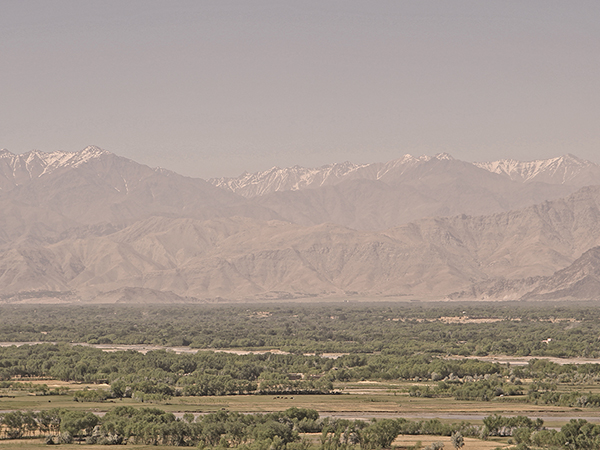(Un)governed Spaces, A Portrait of Afghanistan, Opens at Bennington College
A multimedia exhibition offering a complex portrait of modern Afghanistan through photographs, paintings, text, and video, opens with a reception and artist’s talk.
 The exhibition, (Un)governed Spaces— a collaboration between Bennington faculty member and anthropologist Noah Coburn and artist Gregory Thielker— focuses on the Afghan region surrounding the U.S. military base at Bagram. The region—which has been occupied by Alexander the Great, the Soviet Union, the Taliban, and most recently, the United States—offers a crossroads of past and present. Over the course of the past three years, Thielker and Coburn lived, researched, and toured the region, sharing intimate conversations with locals, interviewing U.S. soldiers, sketching the bazaar and local houses, and conducting historical and ethnographic research both in Afghanistan and the United States
The exhibition, (Un)governed Spaces— a collaboration between Bennington faculty member and anthropologist Noah Coburn and artist Gregory Thielker— focuses on the Afghan region surrounding the U.S. military base at Bagram. The region—which has been occupied by Alexander the Great, the Soviet Union, the Taliban, and most recently, the United States—offers a crossroads of past and present. Over the course of the past three years, Thielker and Coburn lived, researched, and toured the region, sharing intimate conversations with locals, interviewing U.S. soldiers, sketching the bazaar and local houses, and conducting historical and ethnographic research both in Afghanistan and the United States
Said Thielker: “Drawing around the Bagram airbase challenged me to work quickly because we had to keep moving and yet slow down enough in order to really focus on the texture of a concrete barrier, the angles of barbed wire, or the jets flying overhead. But the result was a series of strong impressions that I was able to develop through painting and drawing.“
In one of Thielker’s pieces, a 35-foot-long panoramic painting, the dramatic mountains and lush fields of the Shomali Plain north of Kabul are contrasted with the barbed wire and concrete of the military base. The visual elements are paired with narrative descriptions of the region’s history, ethnographic accounts, and interview selections. The result is a viewing experience that shows the complexity of Afghanistan today, while the instability of the past still echoes.
“Having lived and conducted research in Afghanistan for more than a decade,” said Coburn, “I still struggle to describe the complex ways in which the military has reshaped the communities, and the tensions that exist between the communities and the base. Working with Greg has enabled me to express these ambiguities by exploring new ways of understanding and portraying this complex space. (Un)governed Spaces is a powerful contrast to the predictable narratives of Afghanistan because it combines anthropology and art to create a layered and open-ended presentation of life amid conflict.”
For more information, visit www.ungovernedspaces.com.
Additional events
Tuesday, October 28: Opening and Artist Talk at 6:30 pm, Usdan Gallery
Monday, November 3: A Discussion with Young Afghan and Pakistani Scholar at 7:00 pm, Usdan Gallery
Monday, November 10: National Geographic films presents Restrepo, at 7:00 pm, Usdan Gallery
Other events to be announced on the Bennington College Calendar.
The exhibition will also function as a discussion space for talks and special events related to reflect on the future of Afghanistan and US foreign policy. Noah Coburn’s class “Displaying Culture” will be meeting regularly in the space. The exhibition will draw in the voices of Afghan experts, local residents, and Bennington College students, as well as exhibit visitors.
About the Artist and the Anthropologist
Gregory Thielker lives and works in New Jersey, as well as abroad. His previous work includes a Fulbright Grant on the Grand Trunk Road in India as well as site projects in El Salvador and Norway. Recent solo exhibitions include (Un)governed Spaces at Republic Gallery, Paris, and Highway at Flashpoint Gallery, Washington, D.C. His work has been reviewed in The Independent, La Repubblica, and The Washington Post. He is an assistant professor of Art at The College of New Jersey. Visit his Tumblr at gregorythielker.tumblr.com.
A socio-cultural anthropologist, Bennington College faculty member Noah Coburn teaches courses on the overlap of politics, power, and culture. He has extensive research experience in Afghanistan, including serving as an election monitor during the 2014 Afghan elections. He is the author of a 2014 Washington Post op-ed, as well as Derailing Democracy in Afghanistan (Columbia University Press, 2014) and Bazar Politics: Power and Pottery in an Afghan Market Town (Stanford University Press, 2011).